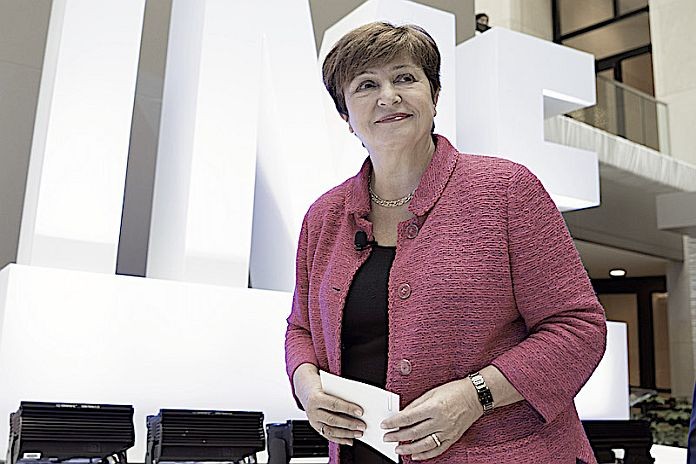-
-
- Introductory Remarks by the Managing Director at the 23rd Jacques Polak Annual Research Conference
-
By Kristalina Georgieva, Managing Director, IMF
This year’s conference is also extra special as we honor Maurice Obstfeld’s contributions to economic policy and research.
Maury’s time at the Fund left a lasting imprint – one that helped us move forward through enhancing our reputation for delivering high-quality research, and by stepping up the Fund’s contribution to policy debate. Under Maury’s stewardship, the Fund’s economic research continued to set the standard in its field.
In the short time I have, I cannot possibly do justice to the full spectrum of Maury’s accomplishments – this is why we need a whole conference! But to get us started, let me highlight a few of his many achievements at the Fund.
- Under his leadership, the World Economic Outlook was the seminal reference in terms of global forecasts and importantly in identifying interconnections and possible spillovers—an important step in transforming our multilateral surveillance in a more shock-prone world.
- The External Sector Report reflected his powerful intellect and raised the Fund’s profile as the only international institution that provides an objective, comprehensive and multilaterally consistent assessment of exchange rates and external imbalances.
- Maury was also instrumental in bringing climate research to the Fund before it became fashionable among economists. He co-authored a book on “Coping with the Climate Crisis” that synthesized the key insights of climate change economics in an accessible way.
- And his contributions on the discussion of the Euro Area fiscal rules were also vital as he advocated for further integration of Europe’s Economic and Monetary Union by supporting the need for a fiscal union.
Overall, Maury has challenged us to broaden our horizon on the range of issues critical to the macroeconomic landscape, and in doing so, he has helped ensure that the Fund remains as relevant today as when it started.
Maury’s academic contributions are also vast and profound. He is the co-author of “the” textbooks in international macroeconomics over the past three decades: “Foundations of International Macroeconomics,” with his fellow former chief economist of the fund, Ken Rogoff; and “international economics: Theory and Policy,” with Paul Krugman and Marc Melitz. He has also extensively written on highly policy-relevant topics, including global external imbalances, financial crises, exchange rates, and monetary policy.
It is not an understatement to say that all of us here today are students of Maury. And, in teaching us, he has equipped us with the power to look back and assess how we move forward.
And, with that, let me turn to the theme of this year’s conference.
Since we last met, the global economy has been hit by one shock after another. The implications of the Russia’s war in Ukraine and the lingering pandemic weigh heavily on the global economic outlook, affecting lives and creating challenges for policymakers. Inflation is at multi-decade highs, with rising food and energy prices, persistent supply-chain disruptions, and mounting debt vulnerabilities. Financial conditions are tightening, while capital flows and exchange rate volatility have increased dramatically -and this is especially concerning for low- and middle-income countries as they face all these challenges coupled with financing constraints and limited access to markets.
This leaves us with a particularly challenging set of questions for how we move forward.
First and foremost, inflation. Arguably, the biggest and immediate challenge for central banks in both advanced and emerging market economies is to bring inflation down. We see central banks tightening monetary policy to restore price stability. Although there is broadly an agreement among central banks that monetary policy should stay the course, challenges related to how to manage the monetary tightening cycle remain open.
Next, the policy mix. Alongside monetary policy, how to formulate and calibrate responsible fiscal policy in an environment with persistent price pressures. Although the priority must be to protect vulnerable households with targeted measures to alleviate the impact of rising food and fuel prices, it should not do so in ways that further fuel inflation and sidetrack the efforts of monetary policy.
Risking public debt burdens are another challenge. Recent data shows that about 60 percent of low-income and about 25 percent of emerging market countries are in or at high risk of debt distress. At this juncture, every finance minister is seeking to fine-tune fiscal policy to ensure the appropriate support to the vulnerable, while preserving a credible fiscal framework and a sustainable debt profile over the medium term.
And finally, we should not forget the most daunting challenge of our time. How do we make sure that we sow the seeds for a green and more resilient planet? Our analysis suggests that we can expect more volatile climate, especially in LICs, if carbon emissions continue unabated, with direct implications for agricultural output. And, while there are strong voices for addressing climate change, we need a strong understanding of the global economic impacts of climate shocks – and even strong voices for action.
We will touch on many of these issues over the coming two days and this will be vital opportunity to learn from the analytical work that will be presented and debated.
And what we take away from here can be a roadmap for the future.
Even though I could not be there with you, I am thrilled that you could gather today in person and make this event happen. And want to wish you a great conference over the next two days.
IMF Communications Department





